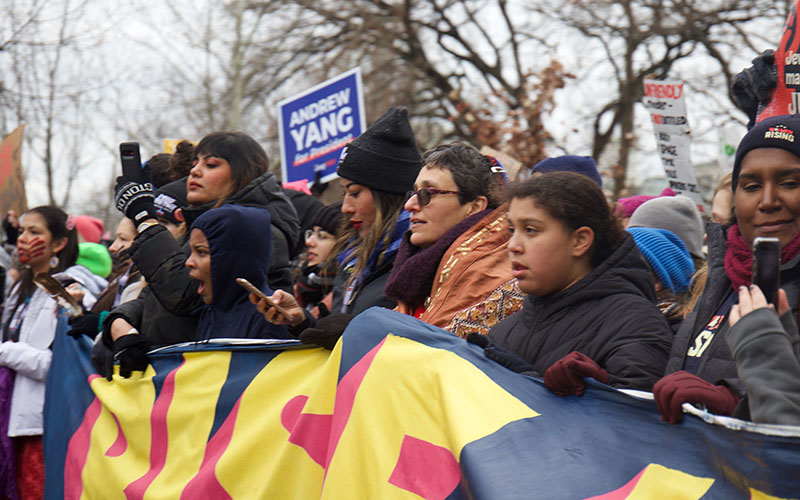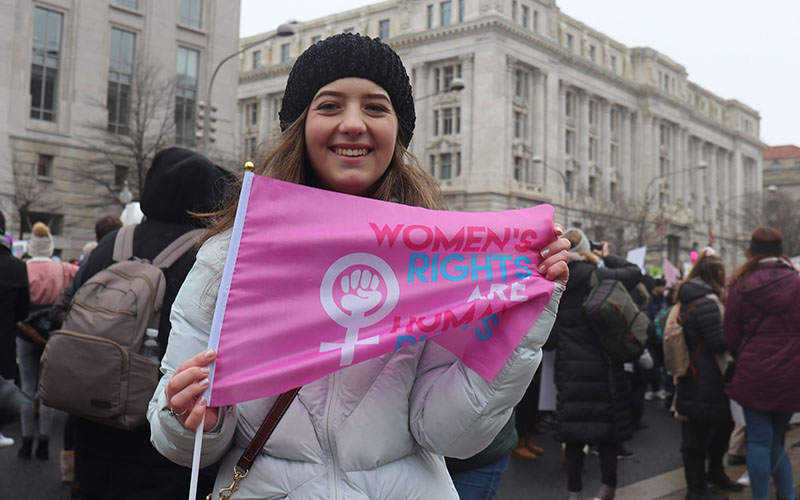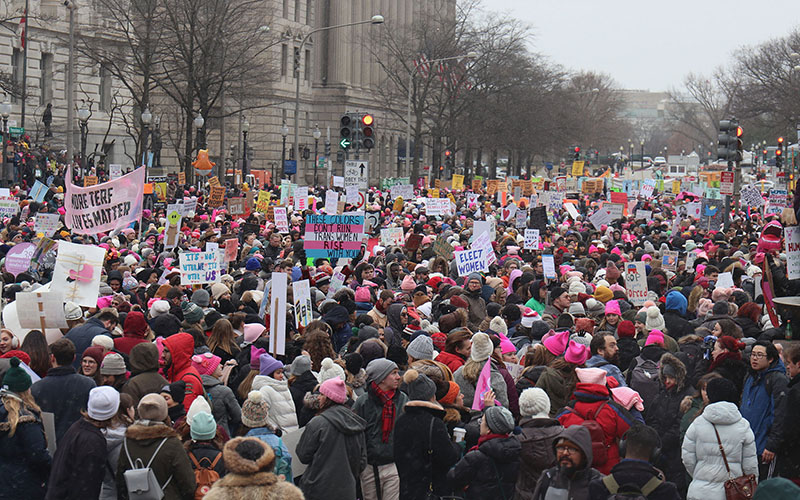
Arizona residents were among the people who came from across the country Saturday for the fourth Women’s March, where marchers pushed messages ranging from reproductive rights to calls for the impeachment of President Donald Trump. (Photo by McKenzie Sadeghi/Cronkite News)

Rachel Sinex, 19, of Tucson, works with Represent Women, a group that pushes for more women in elected office, but said she came to the Women’s March to support the range of issues represented there. (Photo by McKenzie Sadeghi/Cronkite News)

Crowds for this year’s Women’s March in Washington were down from the hundreds of thousands at the first march, the day after Donald Trump’s inauguration in 2017, but several thousand came to march around the White House. (Photo by McKenzie Sadeghi/Cronkite News)
WASHINGTON – Snow and near-freezing temperatures were not about to keep Sierra Maughan from joining thousands of others who marched Saturday in Washington in the fourth annual Women’s March, an event repeated in marches around the country.
“I’ve never been to an event like this, where so many women come together in one place,” said Maughan, a Gilbert native who came to the march from New York, where she is studying. “I think there are lot of things that people are coming out to talk about today, seeing it firsthand is really important.”
She was one of thousands who packed Washington’s Freedom Plaza and marched around the White House under a gray sky and a mix of rain and snow, demanding everything from reproductive rights to President Donald Trump’s ouster from office.
The original Women’s March, held a day after Trump’s inauguration in 2017, drew hundreds of thousands of protesters to Washington and millions more at sister marches around the globe, many sporting the signature pink “pussy hat” of the protest.
There were fewer pussy hats and fewer protesters for Saturday’s march, which had a National Park Service permit that allowed for a demonstration of 3,000 to 10,000 people. But those who turned out were no less passionate.
“It may be cold, but our souls are on fire,” one of the speakers shouted to the crowd.
One protester, who identified herself as Sister Leona, a Phoenix native who now lives in Virginia, said she came “to march with all the women and perform myself – a free women who can do whatever … she wants.”
– Cronkite News video by Kara Harris
Despite the passion, the event was peaceful, with only a handful of counter-protesters. Many of the marchers were dancing and singing during the rally.
One of the most popular rallying cries was “My body my choice,” for reproductive rights. Predictably, that drew some small knots of anti-abortion counter-protesters, holding signs and using megaphones to make their message heard over the marchers.
Rachel Sinex of Tucson said it was interesting not just to see the counter-protesters but to be able to hold a peaceful conversation with them.
“He was respectful of our time and we were able to have a good conversation, which is really refreshing especially with our political climate nowadays,” Sinex said of her discussion with one of the anti-abortion protesters.
Sinex is in Washington interning with Represent Women, a nonprofit that focuses on electing more women to office. She said she wanted to attend the march to support all women’s issues. And there were plenty of issues – both women-specific and others – represented.
The first Women’s March was heavily focused on Trump, and calls for the president’s impeachment were prominent on Saturday, with signs and Baby Trump balloons among the crowd. But this year’s march also included demands for climate action, the Equal Rights Amendment, immigration reform and more.
Women from all demographics chanted “The Earth is on fire,” “Remove Trump now” and “Immigrant justice.” After marching around the White House, some peeled off and continued down Pennsylvania Avenue toward the Capitol.
The week before the march included affiliated events ranging a discussion on climate change to a #NoWarWithIran rally on the Capitol and a Q&A with youth activists. Protesters throughout the day emphasized their message of paving the path for women in future generations, electing more women into office and spreading love instead of hate.
The Washington protest was just one of many planned around the country this weekend that included rallies Saturday in cities around Arizona and an event scheduled for Sunday at the Arizona State Capitol complex.
Sinex, who was attending her first such rally, said it was important to show her support and to see firsthand how powerful the energy was.
“It’s great to see all the camaraderie between women and people of all backgrounds,” she said.
Cronkite News reporter Kara Harris contributed to this report.










